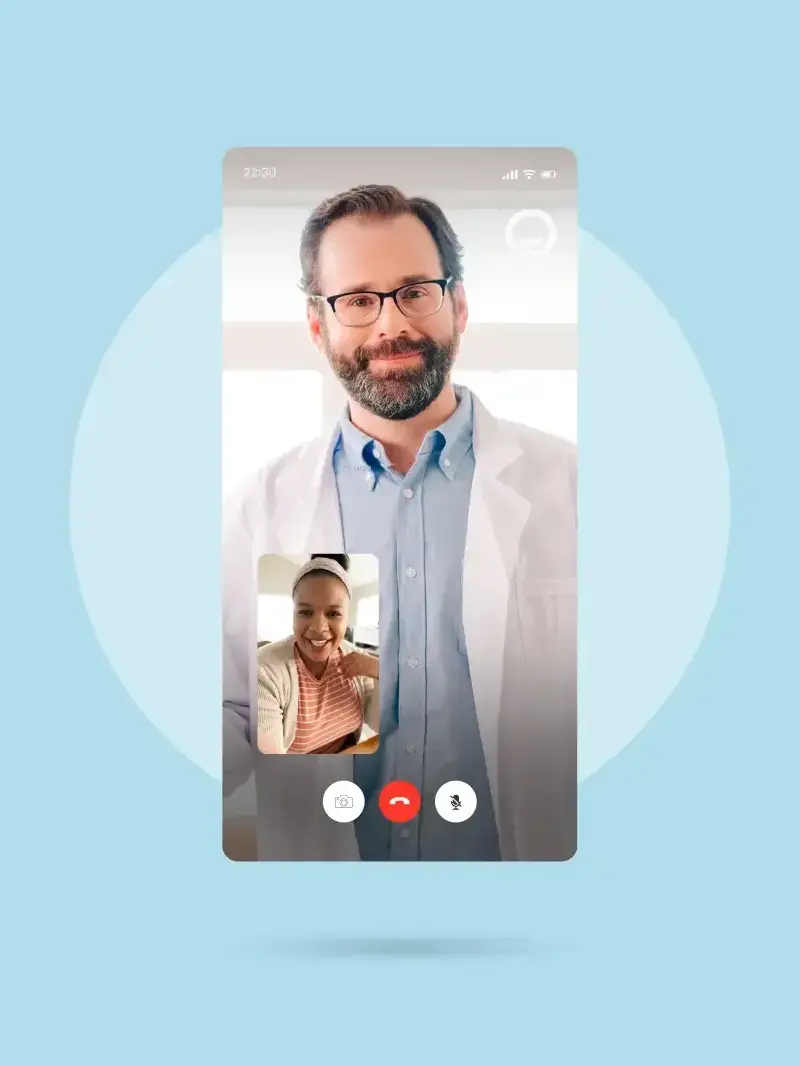Losing weight with PCOS can be challenging for many people, but it can be done. Some recommendations may include reducing your carb intake, eating more protein, and increasing your fiber intake. Our doctors can work with you to develop a treatment plan to lose weight with PCOS.

Polycystic ovary syndrome (PCOS) treatment and medication online
One in ten women in the U.S. struggle with polycystic ovary syndrome (PCOS).1 Speak with a top-rated physician online for a personalized consultation today, and get the right PCOS medication and treatment plan for your symptoms.*
*Prescriptions are provided at the doctor’s discretion. Learn more about our controlled substances policy and how to save 80% with our prescription discount card.
PCOS treatment
Although there's no proven way to cure polycystic ovary syndrome, you can improve symptoms by eating healthy foods and exercising regularly.
Losing five to ten percent of your body weight can help prevent irregular menstrual periods and improve PCOS symptoms. Maintaining a regular weight can also help:
-
Lower insulin levels and blood pressure
-
Reduce your risk of heart disease and diabetes
-
Improve cholesterol and triglyceride levels
If you're experiencing PCOS symptoms, talk to one of our doctors about healthy lifestyle changes and medication options to improve your symptoms.
Polycystic ovary syndrome (PCOS) medication
Common PCOS medications our doctors prescribe include:
Hormonal birth control
Taking birth control pills with progestin can help restore normal hormone levels, relieve symptoms, regulate ovulation, and lower the risk of endometrial cancer.
Metformin
Because many women with PCOS have insulin resistance, this type 2 diabetes medication, Glucophage (metformin hydrochloride), may be prescribed off-label to improve insulin levels. It can also act as an effective PCOS weight-loss medication.
What is polycystic ovary syndrome (PCOS)
Polycystic ovary syndrome (PCOS) is a condition caused by the female body producing an excess of male hormones known as androgens. This hormonal imbalance can cause irregular menstrual periods and make it difficult for women with PCOS to get pregnant.
PCOS can lead to an increased risk of diabetes and heart disease.
The first signs of polycystic ovary syndrome typically include:
-
Irregular periods or missed periods
-
Difficulty getting pregnant
-
Excessive facial or body hair growth
-
Weight gain
-
Thinning hair or hair loss from the head
-
Oily skin or acne
It is important to note that not all women with PCOS will experience the same symptoms.
You should talk to our doctors if:
-
You've had irregular or missed periods and are not pregnant.
-
You have symptoms of diabetes, such as excess thirst or hunger.
-
You are experiencing any other PCOS symptoms.
PCOS treatment FAQs
How to lose weight with PCOS?
How to cure PCOS permanently?
Polycystic ovary syndrome is not curable. However, birth control, weight loss, and other treatments for PCOS can help reduce and manage your symptoms.
How to get pregnant with PCOS?
Some options for getting pregnant with PCOS include:
-
Losing weight
-
Taking fertility medication
-
In vitro fertilization (IVF)
PlushCare does not offer any fertility treatments or consultations at this time. If you are struggling with infertility due to PCOS, please speak to a fertility specialist to assist with your situation.
How do you know if you have PCOS?
To find out if you have PCOS, book an appointment with one of our doctors to discuss your symptoms and screen for PCOS.
How to get PCOS treatment online

Book an appointment to discuss PCOS.

Talk to your physician about your PCOS symptoms.

Pick up your medication for PCOS.
We can send prescriptions to any local pharmacy. Prescriptions are provided at the doctor’s discretion.
Related conditions to polycystic ovary syndrome (PCOS)
Irregular menstrual cycles and hormone imbalances can be related to other conditions. Discussing some of these conditions when meeting with one of our doctors can be helpful.
Obesity
PCOS can cause weight gain. However, obesity can also worsen PCOS symptoms because it increases insulin resistance.
Endometriosis
PCOS and endometriosis can lead to fertility and menstrual cycle issues.
Fibroids
Fibroids can cause heavy periods and issues with fertility, similar to PCOS.
Ovarian cysts
PCOS can cause small ovarian cysts.
Cystitis
Cystitis refers to an inflammation of the bladder, often due to a UTI.
Sleep apnea
Women with PCOS are more at risk of developing sleep apnea.
Anxiety
Hormonal imbalances due to PCOS can affect an individual’s mood, sometimes leading to anxiety.
Acne
The increased androgen levels associated with PCOS may cause acne.
PCOS treatment pricing details
To request PCOS treatment and get a new or refill on your prescription, join our monthly membership and get discounted visits.
30 days of free membership
- Same-day appointments 7 days a week
- Unlimited messages with your Care Team
- Prescription discount card to save up to 80%
- Exclusive discounts on lab tests
- Free memberships for your family
- Cancel anytime
Paying with insurance
Membership
$19.99
First month free
Visits
Copay
Visit price with insurance
Often the same as an office visit. Most patients with in-network insurance pay $30 or less!
We accept these insurance plans and many more:



Paying without insurance
Membership
$19.99
First month free
Visits
$129
Visit price without insurance
Frequent sexual health searches
PCOS resources
Sources:
PlushCare is dedicated to providing you with accurate and trustworthy health information.
-
Women's Health Foundation. Polycystic ovary syndrome. Accessed on July 28, 2023. https://www.womenshealth.gov/a-z-topics/polycystic-ovary-syndrome
-
Johns Hopkins Medicine. Polycystic Ovary Syndrome. Accessed on July 28, 2023. https://www.hopkinsmedicine.org/health/conditions-and-diseases/polycystic-ovary-syndrome-pcos.
-
Mayo Clinic. Polycystic ovary syndrome (PCOS). Accessed on July 28, 2023. https://www.mayoclinic.org/diseases-conditions/pcos/symptoms-causes/syc-20353439
PlushCare content is reviewed by MDs, PhDs, NPs, nutritionists, and other healthcare professionals. Learn more about our editorial standards and meet the medical team. The PlushCare site or any linked materials are not intended and should not be construed as medical advice, nor is the information a substitute for professional medical expertise or treatment.